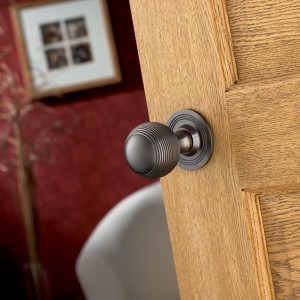
What kind of interior door hardware will you choose?
When considering a door latch for your interior doors, you may find that there are a lot of different units for you to choose from. From bedroom door locks to closet door latches, there are several different types of interior door sets you can choose to suit the need for privacy. Let’s take a look!
Knobs or Levers
The most basic element of function for a door latch is whether it is operated by a knob or by a lever. Knobs are by far the more common in English and American homes, historically speaking. Having more prevalence in continental Europe, levers actually offer several advantages from a practical standpoint. The first is that it doesn’t require gripping and turning, rather you can just push down the tip of the lever to release the door (think of arriving home with a sack of groceries in each arm): that advantage is recognized by the Americans with Disabilities Act (ADA) which requires accessible doors to operate with levers. The second is that the lever is operated on the side away from the door edge, where a knob is typically gripped on both sides, and can cause knuckles to be scraped passing too near the door jamb in certain circumstances. Still because they’re more familiar, knobs are often chosen to appeal to our cultural aesthetic.
Keyed Lock
Keyed knobs or levers provide you with the most privacy because they require a key to unlock them. Many homeowners find themselves using this type of lock on offices, wine cellars, or mechanical rooms to protect valuable contents or to protect kids from injury. While it can be nice to keep prying eyes out, if this key goes missing, you can be locked out of the room.
Privacy Latch
Another style of interior door locks is used for bedrooms and bathrooms. These privacy knob or privacy lever sets provide a locking mechanism inside of the room inhibit operation on the outside, but they also offer a way to cancel the lockout from the outside in case of an emergency. This option is often used in bedrooms or bathrooms because it can signal that someone inside wants privacy to be respected. The emergency access may require a small tool to be inserted through a hole and pushed or twisted to cancel the lock.
Passage Latch
The simplest kind is the passage latch, which allows the door to be latched closed and then to be opened unimpeded from either side. The typical application is for a hall or closet door.
Dummies
Knobs and Levers are also offered as a simple door handle that does not rotate, but rather is fixed in position. Typical coat closets use a pair of door leaves that are hinged on the two side jambs and swing out from the middle. The door leaves will each get a single dummy knob or lever mounted on the outside. An overhead catch is used to hold each leaf closed.
When choosing an interior door lock, you should think about where you are going to be using it as well as how you are going to get inside if you become locked out. For more information on choosing your interior door hardware, call or visit WalterWorks Hardware today!
Choosing Interior Door Hardware with WalterWorks Hardware!
Want more information on choosing door hardware? Check out our weekly blogs or stop by our Annapolis showroom. From homeowners to trade professionals, WalterWorks Hardware has built a name for itself throughout Maryland, Washington, D.C., and northern Virginia including Annapolis, Columbia, Baltimore, and Easton. With a large showroom in Annapolis, Maryland, WalterWorks Hardware is always ready to help you or your clients find the perfect hardware for their home. WalterWorks Hardware offers a wide selection from the most respected manufacturers in the industry. For more information, please call 410-263-9711 or contact us to talk to a hardware expert at WalterWorks Hardware.
Follow us on Facebook, Twitter, Google+, Pinterest, and LinkedIn!
